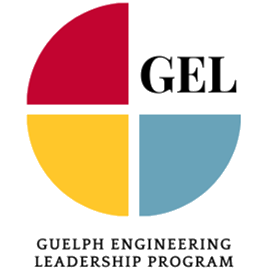7 Closing Workshop
Sania Azim; Tiana Bressan; John Donald; Matthew Curtis; Colleen O'Toole; and Technical Editor: Nicholas Yip

WORKSHOP WRAP-UP
The past 6 workshops have expanded on the traditional view of Engineering Leadership, and positioned engineering in the 21st century, outlining the growing demands for Sociotechnological Leadership. If you feel the need to review any of the past topics, they have been listed below, and each workshop can be revisited at your own pace.
- Self-Awareness & Self-Leadership
- Team Dynamics & Conflict Resolution
- Organizational Leadership
- Professional Development Seminars
- Exploring Indigenous Ways of Knowing in Engineering
- Marketing Your Confidence and Experiences
GUEST SPEAKERS
As this series of workshops come to an end, Matthew Curtis and Colleen O’Toole, two guest speakers and alumni of the University of Guelph, are here to give their experiences with Engineering Leadership in their own professional lives.
MATTHEW CURTIS
KEY TAKEAWAYS
- Spending the time to develop and maintain your personal network pays off in the future, as you have more people you can reach out to for advice and help.
- You have to push yourself to constantly learn new things, as these things may open up different paths for your future and career that would have been unknown to you.
- As an engineer, you must be able to communicate and relate to others. Without being able to empathize or understand the challenges that others face, you will have issues coming up with adequate solutions to their problems.
- Being adaptable allows you to tackle unfamiliar opportunities, giving you more room to learn new skills and grow.
- Understanding your personal biases allows you to take a step back and evaluate the problem from different perspectives. Often, engineers are eager to approach problems from a technical perspective, but it is very important to first consider how the issue affects others before trying to develop a solution for it.
COLLEEN O’TOOLE
KEY TAKEAWAYS
- Know who you are in the world. These core values will help guide your decisions, and help you better empathize with and understand others.
- We can’t change the world on our own, we need a community which we can rely on and contribute to, to help us learn about and correct assumptions we have about the world.
- Understand and manage your privilege. By listening first, and educating yourself on topics you are uninformed about, you can help to mitigate any unknown assumptions you have about anything in life.
- Learn from making mistakes, and learn to “fail forward”. Being afraid to make mistakes can prevent you from ever starting things. Instead, learn to be accountable and make amends after failure, and keep trying so you can improve.
- Know what you want to leave behind, and take steps towards building your legacy. When trying to make changes, you will face many challenges and hard conversations. In such times, you should choose courage over comfort, as you will always need courage to make important changes.
- Communication is key in being reliable and ensuring you don’t overpromise. Managing all the different aspects of your life is difficult, but good communication enables you to clearly express your own personal limitations in any role.
CLOSING REMARKS

